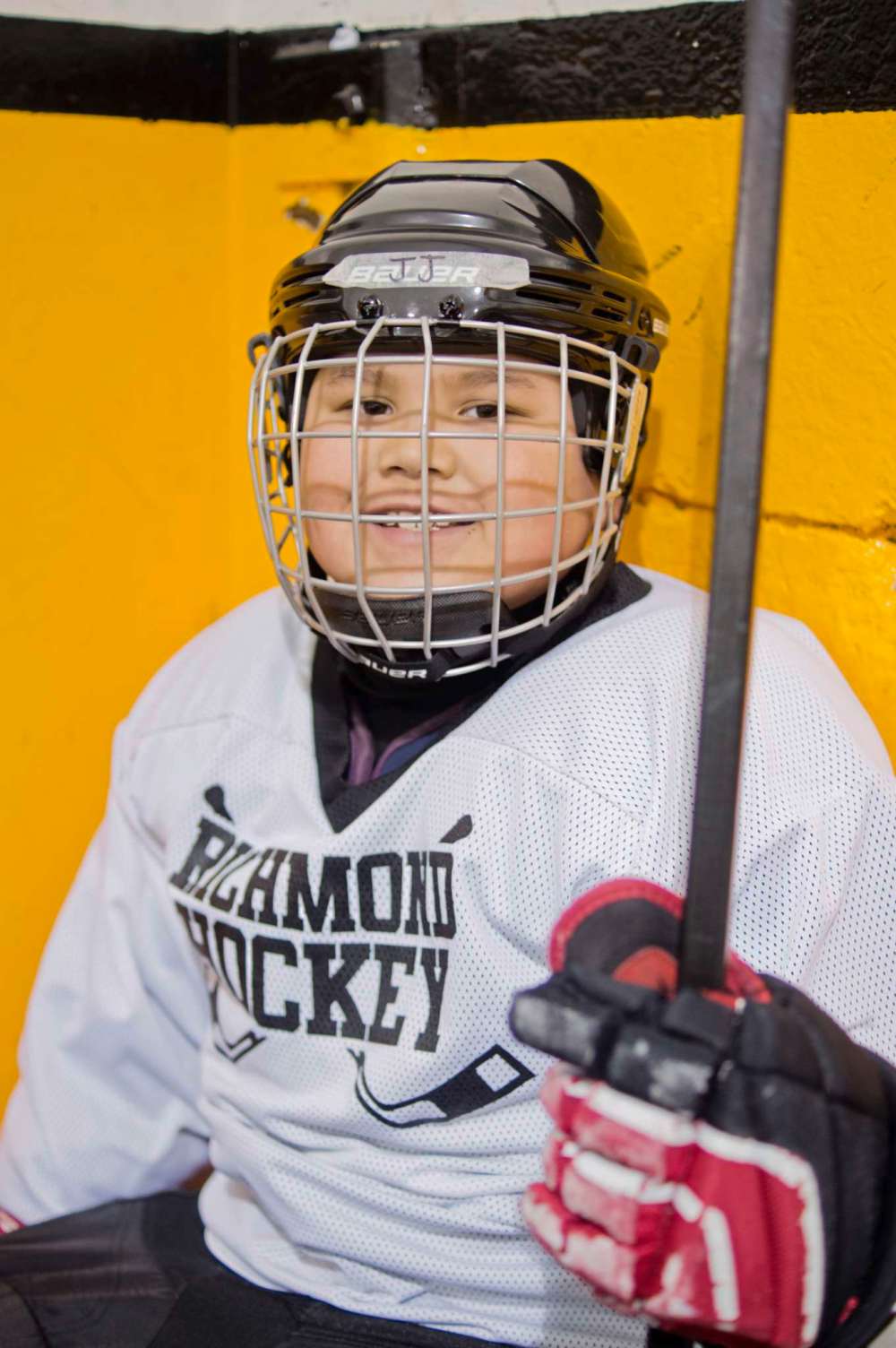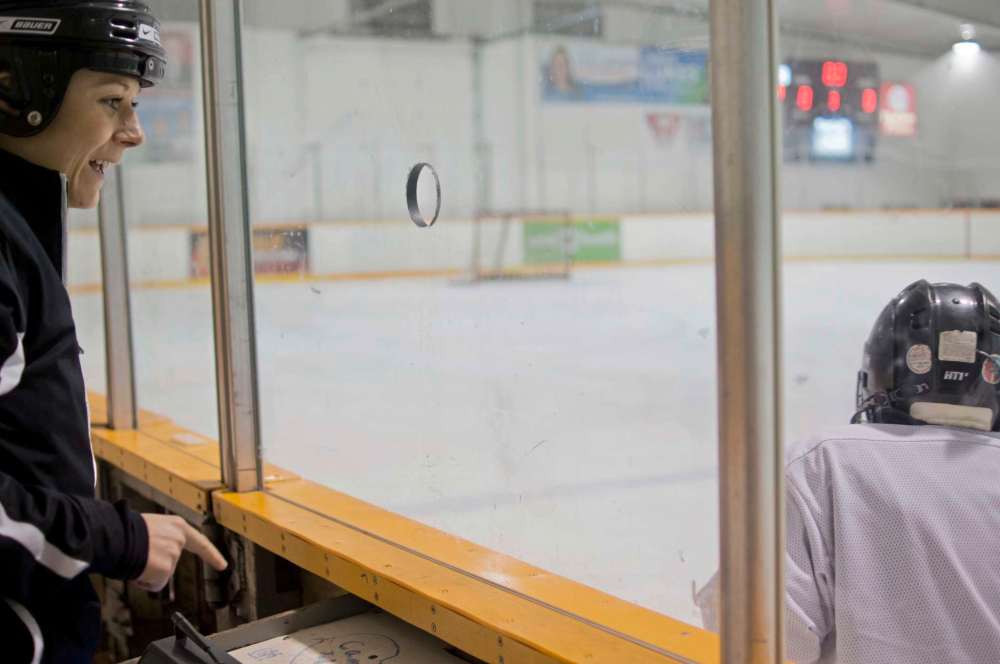Schools team up for bridge-building hockey program
Richmond Hockey creates connections for students
Advertisement
Hey there, time traveller!
This article was published 27/03/2018 (2787 days ago), so information in it may no longer be current.
Justice Johnston is picking up speed, heading down the ice at the community arena in Fort Richmond on a pair of skates he only learned how to lace six months ago.
He’s racing his opponent to the blue line, hoping to beat him to a puck along the boards.
“Skate J.J! Go J.J.!” his coach calls from behind him.

The other skater in a black Richmond Hockey jersey barely beats the nine-year-old to the puck, where Johnston cuts him off along the boards but not before the opposing player smacks the puck down the ice.
The friendly Monday morning scrimmage ends and the players, who are all in grades 4 to 6, head back to the dressing room to get ready — they have to be back in class after the lunch hour.
Johnston, a Grade 4 student at Ryerson School, first put on skates and began playing hockey in October. The opportunity to get on the ice came last fall when teachers and administrators at Acadia Junior High School, Ryerson School, and Dalhousie School (two elementary schools in Fort Richmond) scraped together enough funds to start up an innovative skating and hockey program for students in Grades 4 through 9 who needed a change from the day-to-day classroom routine.
One bulk purchase of skates, helmets and jerseys later, Richmond Hockey was born.
Physical activity as a pathway to learning
Carlee Wilson teaches Grade 1 at Ryerson School and also coaches the hockey program.
I do feel a lot more confident. I improved my skating, I improved my balance, and I’m very happy because now I can go as fast as I wanted to ever since I started.
In its inaugural season, 50 kids are participating and each comes to the program with a different backstory and level of hockey experience, Wilson said.
Some, such as two students who recently arrived from Syria, received their first introduction to ice skating through the program while others were interested in hockey but didn’t have the means to play the game.
“We looked at which kids had trouble focusing in school, which kids had trouble with their attendance records and just in general which kids in our classrooms would benefit the most from the program — maybe they’re not doing any extracurricular after-school or we need a reason to get them motivated to come to school,” Wilson explained.
“Or they’re just an active, busy kid who would benefit from being outside of the classroom and involved in something different that’s not totally academic focused.”
Once a week, the students come to the Richmond Kings site of the South Winnipeg Community Centre, where they begin their day with an hour of hockey-related literacy activities. They write about skill development in their journals, spend time going over hockey strategies and set goals for themselves. Next, they suit up for 40 minutes of ice time, during which coaches lead them through drills before breaking into teams for a friendly match.
Wilson said the level her students are at today is a far cry from the first weeks of Richmond Hockey.

“Most kids were sitting on the ice,” she said. “We took all of these chairs from the main room and brought them out there because they couldn’t skate.
“Within three ice times we said no more chairs,” she said. “It’s amazing. Not one of them can’t skate, they all use a stick, they all have some kind of stick-handling, puck-handling skills, we’ve done tons of passing drills, so they’re starting to incorporate that into the game.”
When Johnston first donned his Richmond Hockey sweater, he admits he felt a little nervous.
“I was thinking, really, that I’m gonna slip a lot but once I started skating I felt a lot safer, so I started getting off the chair and started skating,” Johnston said.
“Why I was nervous was ’cause if I tripped it would be embarassing,” he added.
Not long after he recognized that he and his peers were on the same footing, and they bonded as they tackled a new skill each week. Johnston went as far as creating his own league and invited his new friends to join in this winter at the outdoor rink — the Tigers and the Polar Bears were the two participating teams.
Something that’s been super amazing…is the sense of community between the schools.
“I do feel a lot more confident. I improved my skating, I improved my balance, and I’m very happy because now I can go as fast as I wanted to ever since I started,” Johnston said.
Program creates connections for students
The confidence and connection students have developed on the ice carries through to other parts of their lives, as well. Self-esteem is rising and Wilson said her players are expressing pride in what they’ve accomplished — in both academics and sports — a sentiment rarely expressed in the past.
In a community as diverse as Fort Richmond, there’s also a sense of belonging being formed through the program, she added.
At Dalhousie, a school with over 500 kids, administrators estimate that about 50 different countries are represented in the student population, while at Acadia about 200 students are part of specialized English-language programming.

“Something that’s been super-amazing, and this has really built up in the past three weeks, is the sense of community between the schools,” Wilson said. “Once they come in, they come right over and say hi to their Dalhousie friends and they intermingle between schools and they have friends that they know from another school.
“When they go to Acadia together next year, they’ve recognized that they’ve built this new community and friendship together.”
Joannie Halas, a professor at the University of Manitoba in the faculty of kinesiology and recreation management, said a school-based program such as Richmond Hockey can have multiple effects on kids.
“One of the benefits of physical education is that it’s holistic,” Halas said. “You’re looking at the mind, body, heart and spirit that is engaged when your involved in physical activity and playful activity.”
Two critical components, the heart and the spirit, are also getting a workout, she said. By participating in a culturally relevant sport, the students’ identities are being affirmed and their self worth is validated.
“You develop that sense of belonging but you’re also working to master different skills, like learning to skate, and one of the beauties about physical activity is through practise you can feel success,” Halas said. “It’s embodied within your being.”
One of the beauties about physical activity is through practise you can feel success.
“So there’s a real good sense of being able to be successful that’s not only relevant to you, but certainly here, in Canadian culture, it’s an activity that’s culturally validating in the community.”
On an academic front, Richmond Hockey is also acting as a conduit to the classroom, Halas said, describing the program as a progressive approach to delivering the curriculum. It can show students first-hand how putting in time with pen and paper can help them with sticks and skates.
“The main thing is that it becomes meaningful and relevant to the student and they can see the value of what they’re learning because they can apply it to what they’re doing on the ice,” she explained.
“We know that for newcomers coming in, say, having the language barriers, it can be really challenging to sit in a classroom where you know you’re struggling in comparison to some of your peers in the class and it’s not very validating. But when you can help them achieve these small steps to success, it’s really important.”
The Richmond Hockey program will come to a close at the end of May and Wilson said the administration at the three schools will be looking at ways to keep the program sustainable for the future.
With the major purchase of equipment out of the way, a few fundraisers might be enough to cover expenses and continue to provide students a place to pursue their newly sparked passion.

“Some of their writing and goal-setting, you can see that they’re doing it because they have interest in the sport now,” Wilson said.
“They’re leading their learning in this situation.”





